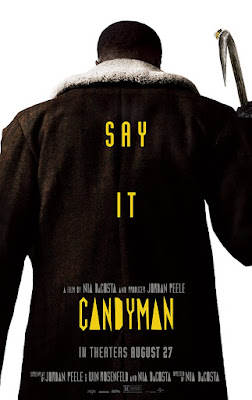Director: Nia DaCosta
Screenplay: Jordan Peele, Win Rosenfeld, and Nia DaCosta
Year: 2021
In 1992 the film "Candyman" was released by director Bernard Rose, which became one of the essential films in horror and proved to be revolutionary. While the slasher subgenre stuck to a rough line, where most movies followed the formula of a villain killing half-naked teenagers for no apparent reason, "Candyman" was much more than that. Rather than focus on gratuitous violence, it decided to expose the social violence that was going on at the time in underserved communities in the United States.
Hearing that, what at the time seemed to be a remake, was in the works, many of us asked the question: is an iconic and near-perfect classic worth remaking? The answer is no, and it is something that Nia DaCosta, Jordan Peele, and Win Rosenfeld were very clear about when entering this project. Rather than being a remake, this 2021 version of “Candyman” is both a sequel and a tribute, or as it's been called a spiritual sequel.
This sequel to "Candyman" takes us back to the city of Chicago, where we follow the couple of Anthony and Brianna. Anthony is an up-and-coming painter who is not going through his best time but suddenly finds inspiration in Cabrini Green's story of gentrification. His new inspiration leads him to run into the myth of Candyman, whose story is closer to him than he imagined.
The way the trio of writers works the script to take advantage of the original film’s fundamental details and put their own touch is simply sublime. You can tell that these people were fans of the original movie, and they respect it, even though they understand that they can further enhance the myth of the enigmatic villain. As is to be expected, social issues are an essential part of the plot, where it is clear that the injustices that were exposed in the 1992 version continue to occur almost three decades later.
A welcome improvement over the original is that in the 1992 version, we see racism, gentrification, and other social injustices against black communities from the perspective of a white woman (which also serves to expose other gender equity issues that also persist for decades later). In this version of 2021, we see the whole development from the perspective of a black man, and we see first-hand the injustices against this community. It is these injustices that give life to the Candyman myth to which the protagonist is so drawn.
I could dedicate many more lines to exploring different details of this film, but with the intention of being concise, I can summarize my thinking that this is an excellent horror film, which is not only limited to what is expected of the genre but goes a lot further, exposing the horrors that inhabit our society. With a sublime script, excellent direction, great acting, and impressive special effects, "Candyman" ranks as one of the strongest contenders in the lists of best horror films of 2021 and is sure to become a modern classic of the genre.















No comments:
Post a Comment